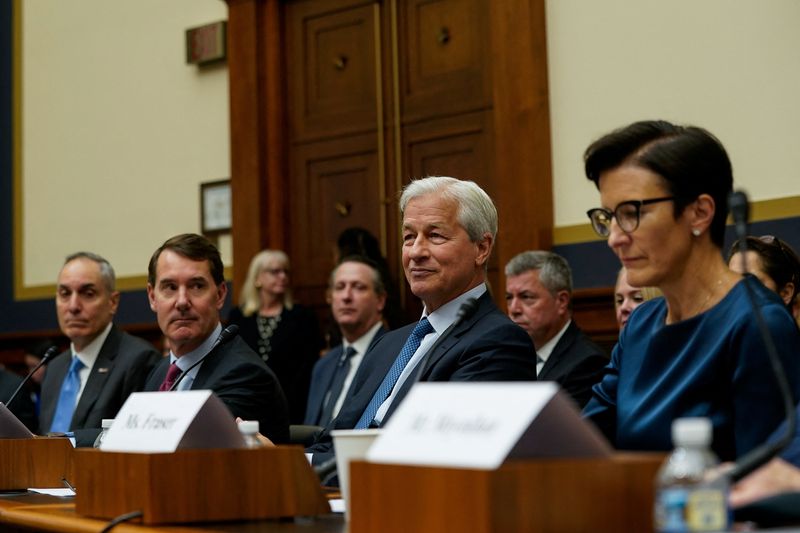By Lananh Nguyen, Saeed Azhar and Scott Murdoch
WASHINGTON/HONG KONG (Reuters) -Top U.S. bankers came under pressure from lawmakers on Wednesday to take a tougher stance on doing business with China amid growing tensions between Washington and Beijing over Taiwan's sovereignty and China's human rights record.
During a hearing before the U.S. House Financial Services Committee, Republican congressman Blaine Luetkemeyer pressed bank chief executives on how they would respond in the hypothetical event of a Chinese invasion of Taiwan.
Lawmakers also asked the CEOs to condemn China's "human rights abuses," in a departure from previous hearings that tended to focus on domestic issues like housing and consumer protection.
"We will follow the government's guidance, which has been for decades to work with China," said Bank of America (NYSE:BAC) Chief Executive Officer Brian Moynihan. "If they change that position, we will immediately change it, as we did in Russia."
JPMorgan Chase (NYSE:JPM) CEO Jamie Dimon and Citigroup (NYSE:C) CEO Jane Fraser both concurred, saying their banks would follow government guidance if China were to invade Taiwan.
The increased scrutiny underscores the challenges the country's largest lenders increasingly face as they try to balance commercial interests with pressure from policymakers, activists and investors to take stances on environmental, social and governance issues.
Wall Street giants including JPMorgan, Goldman Sachs (NYSE:GS) and Morgan Stanley (NYSE:MS) have sought in recent years to expand their businesses in China, the world's second-largest economy.
Authorities there have granted U.S. banks more ownership of their securities businesses despite rising geopolitical tension. Despite a bigger footprint, China is not yet a big profit centre for those banks.
"There would be few significant gains to the U.S. or losses to China if banks pared back operations there," said Hong Kong-based Global Source Partners analyst Andrew Collier.
"The symbolism, however, is more important, because China is very concerned about decoupling in trade and imports of key products like semiconductors, so any pressure on the financial sector would send worrisome signals to Beijing."
Responding to a question about the remarks by U.S. bank CEOs and lawmakers, Chinese foreign ministry spokesperson Zhao Lijian said on Thursday that "the Taiwan question has always been the most important and sensitive issue" for U.S.-China relations.
"The U.S. side should strictly adhere to the One-China principle and the provisions in the three U.S.-China joint communiqués, earnestly and effectively implement the U.S. leaders' stance of not supporting Taiwan independence, stop manipulating issues pertaining to Taiwan."
'HYPOTHETICAL QUESTION'
JPMorgan, which has been in China since 1921, serves Chinese and international corporations, financial institutions and government agencies. Last year it became the first foreign firm to fully own a securities venture in China.
Citigroup, which was the first U.S. bank to set up shop in China in 1902, last year applied for a mainland Chinese securities licence as part of its push to ramp up business in the market.
China has been carrying out military drills near Taiwan in recent weeks. After U.S. House Speaker Nancy Pelosi visited Taipei, China fired missiles into waters near the island, though its activities have since scaled back.
China claims democratically ruled Taiwan as its own territory. Taiwan's government rejects China's sovereignty claims.
Congressman Luetkemeyer asked Fraser what Citigroup would do if a war over Taiwan broke out.
"It's a hypothetical question," Fraser said. "It's highly likely that we will have a reduced presence." Citigroup has a global reach that spans more than 160 countries.
When asked later by Republican Lance Gooden if she would condemn "ongoing human rights abuses in China," Fraser hesitated. "Condemn is a strong word," she said. "We certainly are very distressed to see it."

JPMorgan's Dimon also warned the U.S. had to compete with Chinese banks, which have grown in size over the last few years to become the biggest in the world.
"I am going to do everything in my power to make sure we compete with the best Chinese banks in the world. It is very important for the future of America that America maintains its financial supremacy just like anything else."